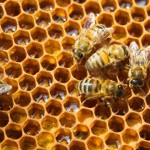 Bees are widely regarded as one of the most important species on the planet. Pollination by bees is estimated to account for around 1/3 of all food we consume. It is understandable therefore that there is widespread concern about the health of the bee population around the world, with some experts going as far as to suggest that the species may become extinct in Britain by 2018.
Bees are widely regarded as one of the most important species on the planet. Pollination by bees is estimated to account for around 1/3 of all food we consume. It is understandable therefore that there is widespread concern about the health of the bee population around the world, with some experts going as far as to suggest that the species may become extinct in Britain by 2018.
The problem prompted the launch of the Danish social enterprise Bybi last year. The project aimed to tackle the dual problem of dwindling bee populations in Copenhagen and the rising homeless population in the city. With the urban environment regarded as a healthy, pesticide free environment for bee colonies to flourish, the Eureka moment was had.
Founder Oliver Maxwell created an ecosystem whereby businesses in Copenhagen could apply to house a bee hive on the roof of their office building. The homeless in the city could then apply for training to become a bee keeper and tend to these hives on a daily basis.
Thus, the disadvantaged were given a new career, the bee population began to thrive again, and a local cottage industry was born selling delicious honey to the people of Denmark. What’s more, it even gives organisations something to add to their own triple line reporting as they provide safe house for this thriving ecosystem. Oh, and of course all of this is done without tapping the tax payer for a single krone.
Bybi isn’t the only interesting project aiming to help protect the global bee population however. A team of academics are currently building a web application that will hopefully allow bee keepers to connect up, both with fellow keepers and with researchers. The keepers will register their hive, record it on a scale and track daily cycles such as its weight, humidity and temperature.
The data can then be used by scientists hoping to reveal patterns in the health of the bee population. Anne Marie Fauvel, professor of liberal studies at Grand Valley State University, said the number of honeybees that survive the winter is low every year. “This is serious because the bees that survive are the ones that continue a colony or establish new ones in the spring,” she said. “Last year, 36 percent were lost. Twenty years ago, it was only 8 percent.”
Fauvel and Jonathan Engelsma, professor of computing, received a $22,140 grant from Bee Informed Partnership that will provide the support to complete and launch the Web application. BIP is a national project that aims to decrease winter mortality of managed honeybee colonies by helping beekeepers keep colonies alive through surveys and data collection.